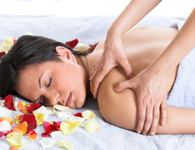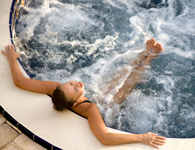Stress Management
 Stress is part and parcel of every body's life, day in and day out. However, degree of stress we feel always differ from individual to individual
Stress is part and parcel of every body's life, day in and day out. However, degree of stress we feel always differ from individual to individualFor example most of us are apprehensive about our future jobs, businesses & incomes around the current economical meltdown. Some of us have 'digged in our heals' and are prepared to take on the circumstances head-on and fight the situation. Yet, too many people are clearly worried and looking up to respective government leaders and world leaders to get them out of this economic mess. A very few are actually ready for the situation as they may have seen the signs of time well in advance and hence, taken the measures to counter the situation.
Irrespective of whatever we are doing, this situation is a classical example of an event where everybody can feel some degree of stress. But, the degree of stress is different to all of us. So, what is it that we act differently to the same situation?
You can conclude that, we are by nature all different personalities, so act differently to a given situation. Right.
But, if we have a closer look, we will see that, it is an individual's ability to handle the stressful situation, which sets them apart and act differently.
There are people, who seems to be able to manage the everyday stress properly and others who are not and looking miserable. The difference is in an individual's ability to cope with a situation and also inculcating 'RELAXATION' in routine life.
Stress can be due to anything that interfere with your thoughts and functioning e.g. - a work deadline, a construction site noise from across the road, a rush hour traffic jam in big metropolis, an unfriendly crowd at a bus stop etc. can all have potential to stress you out. Stress mostly comes from negative experiences but, even positive events can cause stress e.g. - a closing in wedding date, a new born at home, moving from one place to another on a promotion, a new job or new home all have potential to stress you.
 Expert opinions appear to suggest, stress is as a result of imbalance between mind, body and soul.
Expert opinions appear to suggest, stress is as a result of imbalance between mind, body and soul.We know very well that, frustrations creeps in us when our mind and heart is at different platforms. Our heart might suggest us to do one thing but, mind may direct us to other thing. We lose inner peace. Pressure builds in when emotions are suppressed. Are we stressed out? You bet we are.
So, how do you deal with these everyday stresses? Finding the ways to counter the situation can be one way. Coping it on the chin and move on could be another way.
It is important to remember to find any possible solution to a given problem and work towards the solution of that problem rather than looking for an excuse and to pity yourself and blame on any one or every one.
Still, the key is to learn to relax, not only until you have solved the problem and are able to overcome the stress but, also beyond it.
How do you relax? The relaxation can be with a lot of things.
Sometimes you can relax with as simple as doing your exercise routine, having walk in a park with soul mate, a friendly game of catch, a short peaceful nap, confiding in friends and family, reading a favourite chapter from your favourite book, a sauna, a favourite song etc.
The bottom line is you have to find 5-10 minutes of every day and actively practice it as an integral part of routine in your life.
There are several method and techniques. Some of the common relaxation techniques are as follows:
MEDITATION
 Aligning your mind, body and soul together is oldest way of relaxation. Advantages of this mode of relaxation are that you can practice it anywhere and anytime. All meditation techniques teaches you to take control of your breathing and shut all your mental thinking. All you are able to feel is your breath coming in and out in a 'trans' and no tension in any of your body parts.
Aligning your mind, body and soul together is oldest way of relaxation. Advantages of this mode of relaxation are that you can practice it anywhere and anytime. All meditation techniques teaches you to take control of your breathing and shut all your mental thinking. All you are able to feel is your breath coming in and out in a 'trans' and no tension in any of your body parts.Best results are achieved when done in early morning or at bedtime.
VISUALIZATION
Although visualization is a common tool used in enhancing mental toughness in athletes, it is also used as relaxation technique.Optimum results are achieved when visualization is used along with other relaxation techniques.
A successful visualization technique will use as many senses as possible like hearing, feeling, touching and smelling and not merely the seeing. Visualization is also better when 'looking out' from within, rather than spectating from outside.
To start with, visualization should be 3-4 times a week for 10 minutes /day (two 5 minutes sessions) and gradually progressing to 5-6-7 days a week.
PROGRESSIVE MUSCLE RELAXATION
This technique involves in contracting and relaxing specific muscle groups in turn. The relaxation is based on learning to relax your muscles tension. For the purpose of mastering this technique, audio cassette tapes containing instructions are very commonly in use. It teaches us to become more aware of body and its state of tension and /or relaxation.
For the purpose of mastering this technique, audio cassette tapes containing instructions are very commonly in use. It teaches us to become more aware of body and its state of tension and /or relaxation. As the focus is brought to a given muscle group, it is then alternatively contracted and relaxed with total focus on the given to that group. Once you attend relaxation in that group of muscles, then progress to next group and ultimately whole body is relaxed. Starting from toe and progressing all the way to head or vice-versa is individual choice.
At the end progressive relaxation allows a deep level of physical and mental relaxation and thus clears your mind totally of inappropriate thoughts.
Progressive relaxation allows you to monitor muscle tension, and assists you to fall asleep. Hence, it is particularly helpful to athlete in enhancing their capacity to have a quality sleep before a major competition,
CENTERING
Another of breathing exercise, when mastered properly can give deep relaxation for short period, which can be used to change in focus of attention. Centering is actually a shortened version of progressive muscle relaxation.It can be a very useful tool to counter situations which can potentially turn to sudden outbursts of emotions and lead to major disasters eg. in avoiding a road rage.
Centering is also a good coping strategy during strife.
PROFESSIONAL BODY MASSAGE
 Massage can be used to reduce tension and often a very good adjunct to progressive muscle relaxation for total relaxation of body, particularly so after a hard yard is put up in the day,e.g. after a long and hard match or extended traing session.
Massage can be used to reduce tension and often a very good adjunct to progressive muscle relaxation for total relaxation of body, particularly so after a hard yard is put up in the day,e.g. after a long and hard match or extended traing session. Some athletes also use it to provide them a feedback about muscle tension before and after an event.
Massage helps an individual to monitor muscle tone.
Massage therapy is very commonly used to relieve muscle spasms and relieving abnormally tight tissues.
YOGA
Age old technique of relaxation. Uses breathing in combination of stretching the joints. When mastered properly and practiced with patience, it is wonderful and fulfilling relaxation.MUSIC
Relaxation achieved from music is unique and universal and is used very widely as it is well established.Athletes using music for relaxation should be careful in selection of music as there is potential danger of inappropriate effect on arousal level. However, with experience, athletes learn to use several different tapes to good effect.
WATER FLOTATION TANK
Water flotation tanks are bath-tub like enclaves containing hyper-salinated water and filled to its half capacity to provide a floating surface. Individual in it floats comfortably on surface.It creates mood elevation effect. Many case studies have shown deep relaxation with flotation tanks.
JACUZZI, SAUNA & PAMPERING
 Are all very popular relaxation methods.
Are all very popular relaxation methods. There are many more relaxation techniques and methods.
At the end of the day, to manage stress you have to really take a very balanced approach in the life. Sometimes, it can be as simple as setting a very high and unrealistic goal, which can lead to stressful situation. All you have to do is take the stock of things and be realistic.
Sometimes persisting with a rigid attitude can make you 'uptight' and keep you 'ill at ease'. You may feel going to nowhere and are accompanied by an 'anxious' mind leading to stress. But, with relaxation you can have that flexibility of re-visiting your aspired goals again when time is right. (See More)
 |
|
So contact us. We will help to lead a stress-free and balanced life.


